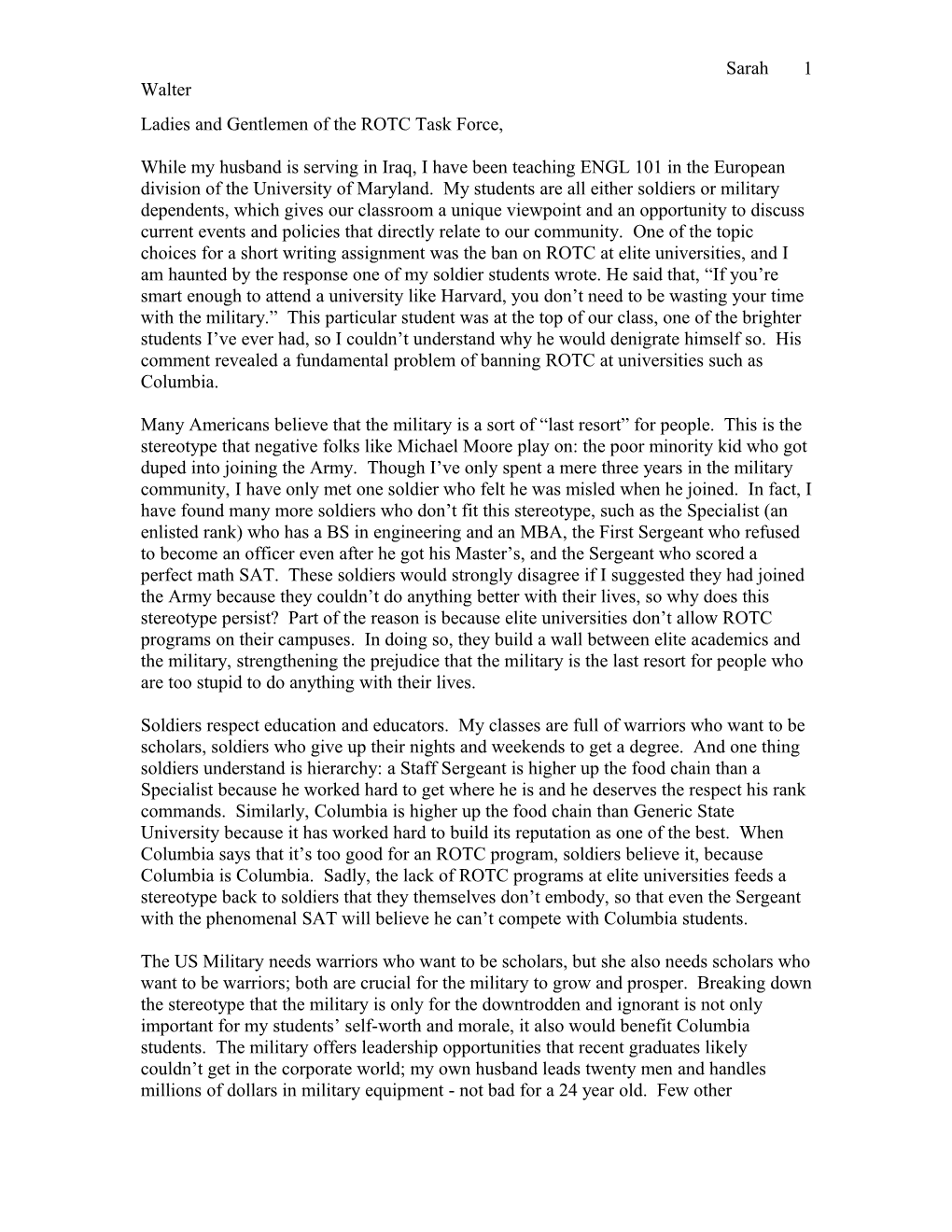1
Sarah Walter
Ladies and Gentlemen of the ROTC Task Force,
While my husband is serving in Iraq, I have been teaching ENGL 101 in the European division of the University of Maryland. My students are all either soldiers or military dependents, which gives our classroom a unique viewpoint and an opportunity to discuss current events and policies that directly relate to our community. One of the topic choices for a short writing assignment was the ban on ROTC at elite universities, and I am haunted by the response one of my soldier students wrote. He said that, “If you’re smart enough to attend a university like Harvard, you don’t need to be wasting your time with the military.” This particular student was at the top of our class, one of the brighter students I’ve ever had, so I couldn’t understand why he would denigrate himself so. His comment revealed a fundamental problem of banning ROTC at universities such as Columbia.
Many Americans believe that the military is a sort of “last resort” for people. This is the stereotype that negative folks like Michael Moore play on: the poor minority kid who got duped into joining the Army. Though I’ve only spent a mere three years in the military community, I have only met one soldier who felt he was misled when he joined. In fact, I have found many more soldiers who don’t fit this stereotype, such as the Specialist (an enlisted rank) who has a BS in engineering and an MBA, the First Sergeant who refused to become an officer even after he got his Master’s, and the Sergeant who scored a perfect math SAT. These soldiers would strongly disagree if I suggested they had joined the Army because they couldn’t do anything better with their lives, so why does this stereotype persist? Part of the reason is because elite universities don’t allow ROTC programs on their campuses. In doing so, they build a wall between elite academics and the military, strengthening the prejudice that the military is the last resort for people who are too stupid to do anything with their lives.
Soldiers respect education and educators. My classes are full of warriors who want to be scholars, soldiers who give up their nights and weekends to get a degree. And one thing soldiers understand is hierarchy: a Staff Sergeant is higher up the food chain than a Specialist because he worked hard to get where he is and he deserves the respect his rank commands. Similarly, Columbia is higher up the food chain than Generic State University because it has worked hard to build its reputation as one of the best. When Columbia says that it’s too good for an ROTC program, soldiers believe it, because Columbia is Columbia. Sadly, the lack of ROTC programs at elite universities feeds a stereotype back to soldiers that they themselves don’t embody, so that even the Sergeant with the phenomenal SAT will believe he can’t compete with Columbia students.
The US Military needs warriors who want to be scholars, but she also needs scholars who want to be warriors; both are crucial for the military to grow and prosper. Breaking down the stereotype that the military is only for the downtrodden and ignorant is not only important for my students’ self-worth and morale, it also would benefit Columbia students. The military offers leadership opportunities that recent graduates likely couldn’t get in the corporate world; my own husband leads twenty men and handles millions of dollars in military equipment - not bad for a 24 year old. Few other professions require the entry-level responsibility that the military bestows on its young officers, an asset they can take with them if they choose to leave the military for the civilian world. Columbia grads would thrive in such a situation, and they won’t be leading the impoverished and stupid; they will be leading warriors who possess degrees and determination. They will be leading soldiers such as my students, soldiers who, when motivated, can perform far better than one would expect from the “last resort” crowd. Reinstating the ROTC program at Columbia would be a big step towards breaking this stereotype.
Sincerely,
Sarah Walter
Wuerzburg, Germany
